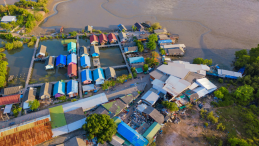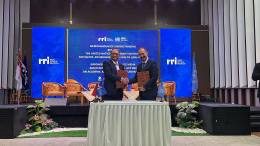The United Nations Children’s Fund (UNICEF), the International Organization for Migration (IOM), Georgetown University, and the United Nations University have today launched new guidelines to provide the first-ever global policy framework that will help protect, include, and empower children on the move in the context of climate change.
The Guiding Principles for Children on the Move in the Context of Climate Change provides a set of 9 principles that address the unique and layered vulnerabilities of children on the move both internally and across borders as a result of the adverse impacts of climate change. Currently, most child-related migration policies do not consider climate and environmental factors, while most climate change policies overlook the unique needs of children.
The guidelines note that climate change is intersecting with existing environmental, social, political, economic, and demographic conditions contributing to people’s decisions to move. In 2020 alone, nearly 10 million children were displaced in the aftermath of weather-related shocks. With around one billion children – nearly half of the world’s 2.2 billion children – living in 33 countries at high risk of the impacts of climate change, millions more children could be on the move in the coming years.
Developed in collaboration with young climate and migration activists, academics, experts, policymakers, practitioners, and UN agencies, the guiding principles are based on the globally ratified Convention on the Rights of the Child and are further informed by existing operational guidelines and frameworks.
The guiding principles provide national and local governments, international organizations and civil society groups with a foundation to build policies that protect children’s rights.
The organizations and institutions are calling on governments, local and regional actors, international organizations, and civil society groups to embrace the guiding principles to help protect, include, and empower children on the move in the context of climate change.
UNICEF
“Every day, rising sea levels, hurricanes, wildfires, and failing crops are pushing more and more children and families from their homes,” said UNICEF Executive Director Catherine Russell. “Displaced children are at greater risk of abuse, trafficking, and exploitation. They are more likely to lose access to education and healthcare. And they are frequently forced into early marriage and child labour. Working together, through coordinated action informed by these principles, governments, civil society, and international organizations can better protect the rights and well-being of children on the move.”
IOM
“The climate emergency has and will continue to have profound implications for human mobility. Its impacts will be most severe with particular segments of our communities such as children, we cannot endanger future generations,” said IOM Director General António Vitorino. “Migrant children are particularly vulnerable when moving in the context of climate change yet their needs and aspirations are still overlooked in policy debates. With these guiding principles we aim to ensure visibility to their needs and rights, both in policy debates and programming. Managing migration and addressing displacement of children in the context of climate change, environmental degradation and disasters is an immense challenge that we must address now.”
Georgetown University, Institute for the Study of International Migration
“While the new guidelines do not offer new legal obligations, they distill and leverage key principles that have already been affirmed in international law and adopted by governments around the world,” added Elizabeth Ferris, Director of Georgetown University’s Institute for the Study of International Migration. “We urge all governments to review their policies in light of the guiding principles and take measures now that will ensure children on the move in the face of climate change are protected today and in the future.”
United Nations University Centre for Policy Research
“The international community has been sounding the alarm on climate change and environmental degradation for years, as well as the likelihood of mass human displacement. These predictions have come true with climate-related migration observed in all parts of the world. Among those that move because of the rapidly changing climate are an increasing number of children. While these children benefit from a range of international and national protections, the subject matter is highly technical and difficult to access, creating a protection deficit for child migrants,” added David Passarelli, Executive Director of United Nations University Centre for Policy Research. “UNU, UNICEF, and our partners have stressed the need for concise guidelines that communicate risks, protections, and rights in clear and accessible language. The Guiding Principles for Children on the Move in the Context of Climate Change were developed with this specific objective in mind. This tool helps navigate the complex nexus of migrant rights, children’s rights, and climate change in order to respond more quickly and effectively to the needs of children on the move in the context of climate change.”





